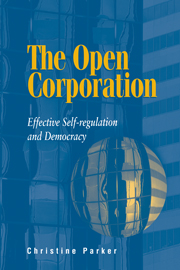Book contents
- Frontmatter
- Contents
- List of tables and figures
- Preface
- Acknowledgements
- 1 Introduction: Corporate self-regulation in the new regulatory State
- 2 The potential for self-regulation
- 3 Motivating top-management commitment to self-regulation
- 4 Cultivating self-regulation leadership
- 5 Self-regulation methodology and social harmony
- 6 The pathologies of self-regulation
- 7 Model corporate Citizens: The role of self-regulation Professionals
- 8 The three strategies of ‘permeability’ in the open Corporation
- 9 Meta-regulation: The regulation of self-regulation
- 10 Conclusion
- Appendix: Methodology
- Notes
- Reference
- Index
1 - Introduction: Corporate self-regulation in the new regulatory State
Published online by Cambridge University Press: 05 July 2014
- Frontmatter
- Contents
- List of tables and figures
- Preface
- Acknowledgements
- 1 Introduction: Corporate self-regulation in the new regulatory State
- 2 The potential for self-regulation
- 3 Motivating top-management commitment to self-regulation
- 4 Cultivating self-regulation leadership
- 5 Self-regulation methodology and social harmony
- 6 The pathologies of self-regulation
- 7 Model corporate Citizens: The role of self-regulation Professionals
- 8 The three strategies of ‘permeability’ in the open Corporation
- 9 Meta-regulation: The regulation of self-regulation
- 10 Conclusion
- Appendix: Methodology
- Notes
- Reference
- Index
Summary
In his book on Management and Machiavelli, Anthony Jay draws a parallel between the relationship of employees to today's large corporations and of medieval or Renaissance Citizens to the city-state (say Florence or York):
For most of the employees of big corporations, the power of the government to make them happy or miserable is very small: a rise in bank rate may slightly affect the costs of a mortgage; over a long period the establishment of a health Service, the abolition of military Service, the building of roads, the preservation of the countryside, and so on may raise the general quality of their lives … The power of the Corporation over their lives is far greater. They can be told to go and live in another part of the country, or another part of the world … they can be publicly exalted in the eyes of all their colleagues … or publicly humiliated, passed over in favour of a subordinate; and these are not things that happen to all alike but specifically and personally to them. Of course they are free to resign, just as the Neapolitan could go and live in Venice; but he might arrive with a record and a reputation … The government is like Christendom, an overriding System of law which only very marginally affects the actual physical conditions of their lives, but gives them an illusion of equality in that their vote weighs as heavy in the ballot box as the Chairman's or the Managing Director's.
- Type
- Chapter
- Information
- The Open CorporationEffective Self-regulation and Democracy, pp. 1 - 30Publisher: Cambridge University PressPrint publication year: 2002



